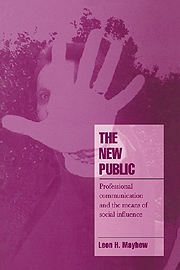2 - Rhetoric and reason
Published online by Cambridge University Press: 06 September 2009
Summary
Public influence is delivered through rhetoric, which Aristotle defined as the available means of persuasion. Rhetorical persuasion is not entirely reasonable. In the Aristotelian formulation, rhetoric includes logical argument, but it also allows, as available means, appeals to the character of the speaker and the emotions of the audience. Rational discourse gains a foothold in public life only to the extent that society includes specialized public forums for mutual persuasion that require participants to engage in sincere, two-sided exchanges and to accept good arguments as grounds for decision. Such forums are rare in the New Public. Because of the crucial role of rhetoric in public influence, I introduce the study of influence in the New Public by reviewing the protean appeals of rhetorical practice.
Rhetoric and the social order
In discourse about the good society, myths of origin are rhetorical terms for social cohesion. They represent, in rhetorical form, ideas about universal and ever present sources of social solidarity. For example, the myth of the great lawgiver, whether human or divine, asserts the enduring importance of normative rules in producing social order. The rhetorical force of such metaphors derives from the narrative appeal of what Derrida has called “the metaphysics of presence” – the notion in Western thought that our current experience both derives from and disguises the original events that, in all their foundational purity, lie behind the present moment (Derrida 1976 [1967]).
Social contract theories are myths of reason. They assert that the underlying grounds of society are the mutual obligations that rational people take upon themselves in return for the benefits of orderly self protection, social peace, and the achievement of collective purposes.
- Type
- Chapter
- Information
- The New PublicProfessional Communication and the Means of Social Influence, pp. 21 - 48Publisher: Cambridge University PressPrint publication year: 1997

